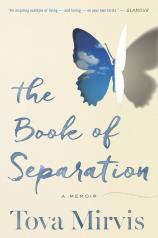The Book of Separation: A Memoir
Review
The Book of Separation: A Memoir
Early in her lovely and bittersweet memoir, Tova Mirvis quotes herself as saying, “I don’t know how to stop being something I always was.” Her transition --- from one identity to another, from an Orthodox mother and wife, to a secular Jewish woman --- is the subject of THE BOOK OF SEPARATION. A popular and bestselling novelist, Mirvis shares in this book the religious doubts that plagued her most of her life, the circumstances of her divorce, her decision to no longer be Orthodox, and the rebuilding of her life based on her legitimate self and true beliefs.
Mirvis was raised in the Modern Orthodox Jewish community of Memphis. While her parents were perhaps more open-minded than others in their world, the religious and social expectations that ordered their lives were strict and mostly inflexible. Religious law dictated diet, education, ritual, even dress code. From an early age, Mirvis bristled against the rigidity of her community and internally questioned religious authorities like rabbis and teachers, as well as scripture and custom. Still she did her best to conform, physically, mentally and spiritually, despite how difficult it was to silence the voices in her head telling her she was not good enough, not Orthodox enough.
"THE BOOK OF SEPARATION is such an honest book.... As sad as the memoir is sometimes, it is, overall, a hopeful story and well worth the read."
Studying at a secular college, but surrounded by other Orthodox students, Mirvis begins writing in earnest and meets Josh, who she will date for just 12 weeks before getting engaged and who she will marry after graduation. While she and Josh agree on a lot, and have three wonderful children together, even before their wedding ceremony, stresses begin to alter their relationship. The wiggle room Mirvis needed to express herself, rethink her Judaism, and raise her children with openness and compassion ended up not being available in her marriage with Josh; close to her 40th birthday they divorced. Choosing to leave Orthodoxy was huge, and more difficult than those unfamiliar with it may easily understand. But she skillfully and poignantly describes her feelings and responses.
Mirvis advises her middle child, himself doubtful of Jewish belief and struggling under the parameters of Orthodox law, “life is about exploring and grappling and growing. You are allowed to change, even when it’s painful. You’re allowed to decide who you want to be.” Of course, readers want Mirvis to apply that wisdom to herself, yet it is easier said than done for her. But slowly, day by day, and holiday by holiday, she comes to terms with her Orthodox past, her new normal and the future she envisions. Mirvis realizes that she can find comfort in some traditions, especially as she shares them with her family, without feeling oppressed by Orthodoxy. In preparing for Passover, she writes that “all of this [is] not out of a sense of religious obligation but for the sake of the people I love.” More even than acting for the sake of the people she loves, Mirvis dares to act for herself, and that transformation makes for a compelling and poignant read.
Though the details of a life in Orthodoxy are quite specific, much of what Mirvis writes about --- change, identity, family, spirituality, friendship, marriage and loss --- is universal. THE BOOK OF SEPARATION is such an honest book. Mirvis is critical but never mean toward her community of origin, and her personal insights and courage are well captured on the page. As sad as the memoir is sometimes, it is, overall, a hopeful story and well worth the read.
Reviewed by Sarah Rachel Egelman on September 22, 2017
The Book of Separation: A Memoir
- Publication Date: September 18, 2018
- Genres: Memoir, Nonfiction
- Paperback: 336 pages
- Publisher: Mariner Books
- ISBN-10: 1328477878
- ISBN-13: 9781328477873




